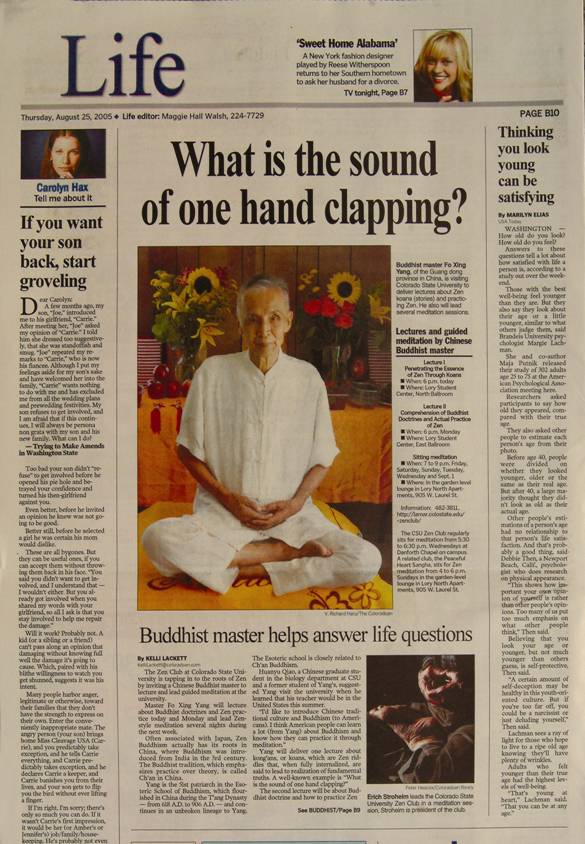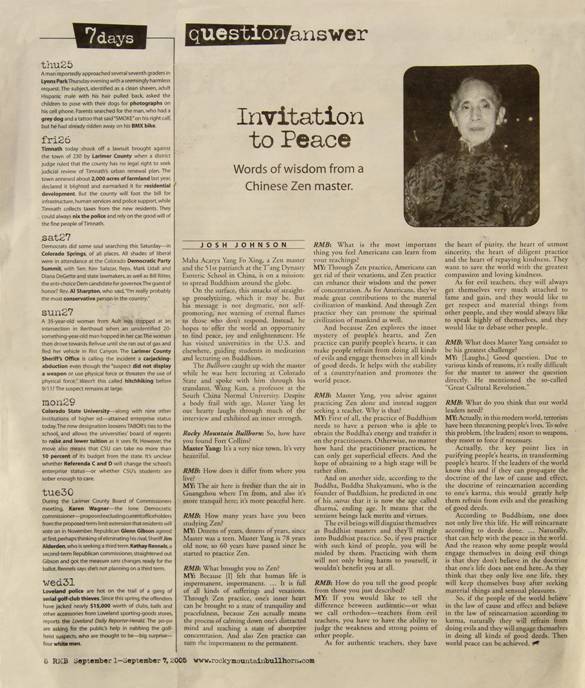Interviews
|
A report published in The Coloradoan.
¡¡ Thursday, August 25, 2005 What is the sound of one hand clapping?
Author: Kelli Lackett; Coloradoan staff
The Zen Club at Colorado State University is tapping in to the roots of Zen by inviting a Chinese Buddhist master to lecture and lead guided meditation at the university. Often associated with Japan, Zen Buddhism actually has its roots in China, where Buddhism was introduced from India in the 3rd century. The Buddhist tradition, which emphasizes practice over theory, is called Ch'an in China. Yang is the 51st patriarch in the Esoteric School of Buddhism, which flourished in China during the T'ang Dynasty - from 618 A.D. to 906 A.D. - and continues in an unbroken lineage to Yang. The Esoteric School is closely related to Ch'an Buddhism. Huanyu Qiao, a Chinese graduate student in the biology department at CSU and a former student of Yang's, suggested Yang visit the university when he learned that his teacher would be in the United States this summer. ¡°I'd like to introduce Chinese traditional culture and Buddhism (to Americans). I think American people can learn a lot (from Yang) about Buddhism and know how they can practice it through meditation.¡± Yang will deliver one lecture about kong'ans, or koans, which are Zen riddles that, when fully internalized, are said to lead to realization of fundamental truths. A well-known example is ¡°What is the sound of one hand clapping?¡± The second lecture will be about Buddhist doctrine and how to practice Zen through meditation. Practicing Buddhist meditation helps remove from one's consciousness the seeds of bad karma - seeds sown through previous actions, Yang said through translator Kun Wang on Tuesday in Fort Collins as he prepared for the lectures. Clearing away bad karma determines in what form you will return in the next life, he said. ¡°According to Buddhism, people are not only going to live one life,¡± Yang said. ¡°We shouldn't be content with transitory things. ...What is important is to solve the problem of life and death.¡± The seeds of bad karma veil one's true self, Yang said. Thus, Buddhist meditation also can lead to wisdom and true happiness, he said. ¡°Westerners seek after material and sensual pleasures. Such seeking is the origin of suffering. If you practice Zen, even if it's difficult, you experience the merging of oneness and wisdom and samadhi (concentration),¡± Yang said. ¡°No worldly pleasure can be compared to this type of happiness.¡± Even if a person is not a firm believer in multiple lives or in ultimate wisdom, meditation can help develop clarity of mind and focus in all areas of life, Yang said. ¡°For a workman to do work well, he has to sharpen his tools. Having tools refers to his mind...Meditation can enhance one's wisdom and one's intelligence,¡± Yang said. If you want to practice meditation, Yang advises against practicing completely on your own and suggests that you find an authentic and authoritative teacher. ¡°Some disguise themselves as teachers, and they have no power to instruct others,¡± he said. Lectures and guided meditation by Chinese Buddhist master Lecture I Lecture II Sitting meditation Buddhist master Fo Xing Yang, of the Guang dong province in China, is visiting Colorado State University to deliver lectures about Zen koans (stories) and practicing Zen. He also will lead several meditation sessions. Copyright (c) The Coloradoan. All rights reserved. Reproduced with the permission of Gannett Co., Inc. by NewsBank, inc.
Invitation to Peace Words of Wisdom from a Chinese Zen master JOSH JOHNSON of Rocky Mountain Bullhorn Maha Acarya Yang Fo Xing, a Zen master and the 51st Patriarch of the T¡¯ang Dynasty Esoteric School in China, is on a mission: to spread Buddhism around the globe. On the surface, this smacks of straight-up proselytizing, which it may be. But his message is not dogmatic, not self-promoting, not warning of eternal flames to those who don¡¯t respond. Instead, he hopes to offer the world an opportunity to find peace, joy and enlightenment. He has visited universities in the U.S. and elsewhere, guiding students in meditation and lecturing on Buddhism. The Bullhorn caught up with the master while he was here lecturing at Colorado State and spoke with him through his translator, Wang Kun, a professor at the South China Normal University. Despite a body frail with age, Master Yang let out hearty laughs through much of the interview and exhibited an inner strength. Rocky Mountain Bullhorn: So, how have you found Fort Collins? RMB: How does it differ from where you live? RMB: How many years have you been studying Zen? RMB: What brought you to Zen? RMB: What is the most important thing you feel Americans can learn from your teachings? RMB: Master Yang, you advise against practicing Zen alone and instead suggest seeking a teacher. Why is that? And on another side, according to the Buddha, Buddha Shakyamuni, who is the founder of Buddhism, he predicted in one of his sutras that it is now the age called dharma-ending age. It means that the sentient beings lack merits and virtues. RMB: How do you tell the good people from those you just described? RMB: What does Master Yang consider to be his greatest challenge? RMB: What do you think that our world leaders need? Actually, the key point lies in purifying people¡¯s hearts, in transforming people¡¯s hearts. If the leaders of the world know this and if they can propagate the doctrine of the law of cause and effect, the doctrine of reincarnation according to one¡¯s karma, this would greatly help them refrain from evils and the preaching of good deeds.
We would love to hear from you regarding your comments and suggestions. Please feel free to contact us at tangmi8@yahoo.com.cn As new articles are posted from time to time, please visit us again.¡¡ |

